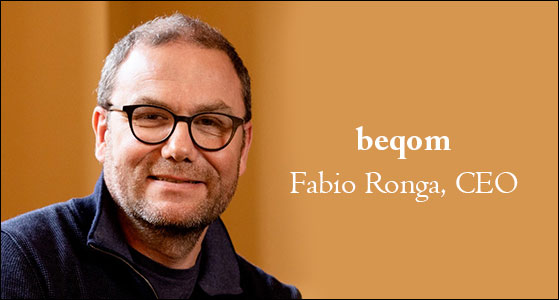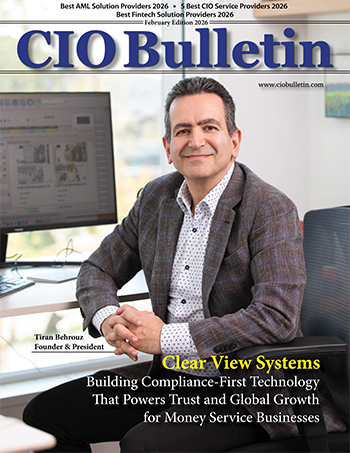CIO Bulletin

Beqom was founded in 2009 with the mission to help the world's largest enterprises keep their people motivated and productive through comprehensive, equitable, and transparent performance and rewards. At beqom, the team is driven by a bold vision to transform the way organizations manage their compensation practices. Founded in 2009 by former SAP employees Fabio Ronga, Tanya Jansen, and Stephan Pohl set out to blaze a trail in the industry by offering one of the first comprehensive compensation platforms that transforms how companies reward and recognize their people, attract and retain top talent, and address pay equity and transparency. Today, more than 120 of the world's largest enterprises trust beqom to help manage the compensation of millions of employees. It's a testament to beqom’s commitment to excellence and its unwavering focus on delivering innovative solutions that help clients achieve their goals.
At the heart of beqom’s mission is the belief that providing employees with a sense of purpose, engagement, and fairness is essential to building productive and high-performing workplaces. That's why Beqom recently introduced a next-generation performance management solution that aligns personalized rewards with real-time performance and people data, taking the employee experience to the next level. Beqom is passionate about making a real difference in the world and helping its clients succeed. With a proven track record of success and an unwavering commitment to driving progress and delivering value, beqom is leading the way in transforming compensation and performance management for the modern enterprise.
The deep need for recognition
Employees are humans and humans like to be acknowledged. Yet it is sometimes surprising how stingy we humans can be with our acknowledgment of others, given that it costs nothing and takes so little time.
An article in Psychology Today notes that for the majority of people “wishing to be explicitly recognized for what you do relates to the fact that validation from others just feels good. Reaching all the way back to childhood and your need for your parents’ reassurance and approval, being acknowledged by others helps you feel more accepted and secure.” If it’s such a deep-seated need, it only makes sense that it would be a strong motivator. Yet often people, including employers, peer, and managers, withhold praise.
The PT article posited reasons that a person might hesitate to acknowledge another:
Ouch.
None of those reasons are very flattering to the person who is withholding the acknowledgment. In a business setting, it may have more to do with the corporate culture. Every business has a culture, whether it is spoken or unspoken, intentional or unintentional. If a culture of recognition is not consciously nurtured by management and HR, the culture may default to the typical command and control model. Perhaps it boils down to a background fear that if we acknowledge an employee they will (a) not strive to do better or (b) ask for more money or a promotion.
Research suggests that a scarcity mentality around recognition is counterproductive. According to O.C. Tanner’s 2022 Global Culture Survey, when you show employees they are valued, “you increase employee engagement, boost employee morale, become an even greater place to work, and build a company culture where employees thrive. When employees feel appreciated, there is an 84% decrease in the chance they will experience burnout.” The report finds that “When companies celebrate together, employees are 20x more likely to feel connected and want to stay.” Research shows that acts of courtesy, helping, and praise are predictive of productivity, efficiency, and lower turnover rates. Easily align your organization’s rewards with its goals and culture, giving employees what they need while optimizing the top and bottom lines — all without spreadsheets. beqom provides all the flexibility you need to unlock the potential of your people with the right compensation strategy.
Manage salary reviews globally while adhering to local guidelines and policies. Budget, benchmark, and track all salary processes and associated costs in one platform. beqom provides comprehensive salary views for HR, Finance, managers, and employees.
The benefits of a feedback culture
Creating a culture of feedback whereby peers support each other through regular, positive feedback can go a long way toward making employees feel appreciated and cultivating a sense of belonging. Here are three important benefits of including feedback and recognition in your performance management system.
Create a learning culture. Giving employees feedback and recognition can increase self-awareness about opportunities to develop and strengths they can lean into. Providing opportunities for employees to learn and recognizing their effort and time spent focusing on self-improvement can be the foundation of a learning culture and shows the importance of employee feedback.
Increase happiness. A workplace where positive reinforcement and constructive feedback are embraced creates happy employees. Happy employees are productive employees. Recognizing individuals and teams can boost their confidence, promote collaboration, enhance loyalty, and boost the overall morale of the organization.
Improve employee retention. Hiring an employee is a significant investment. Once they are hired, they need training, development, and motivation to perform. A great way to show appreciation to your employees and keep them motivated is by creating a rewards and recognition program.
A culture-led employee experience can transform your performance management systems and inspire your employees to reach their potential and your organization to improve overall performance on metrics you can measure.
Compensation is recognition too
For most workers, compensation provides the means to pay the bills and improve the standard of living for themselves and their families. It’s tied to survival and aspirations, making it a powerful motivator and sensitive topic. But an often overlooked aspect of compensation is that it serves as a proxy for recognition and acknowledgment. It is a way of expressing the employer’s opinion of the value of the employee. In that light, compensation is also related to the need for recognition and acknowledgment.
People want to produce work they are proud of and be recognized for it. Both compensation and other forms of recognition can serve that end. In the final analysis, employee satisfaction is linked to knowing what contribution they made and having that contribution recognized. Manage compensation well, but don’t be stingy with recognition. It can transform your workforce! beqom enables you to comprehensively plan headcount, budgets and forecasts based on past, current and future data. The platform provides an iterative budgeting process across all countries and populations.
Fabio Ronga, CEO

Insurance and capital markets







